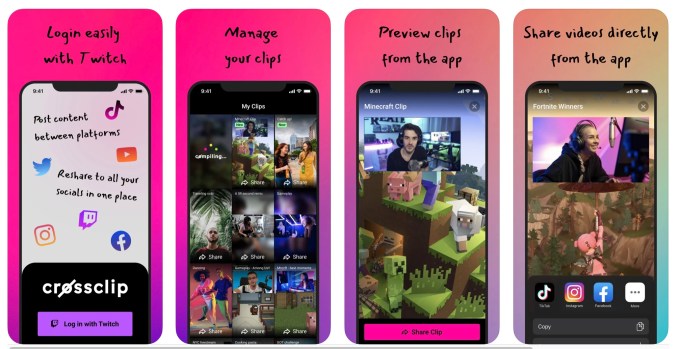- July 24, 2021
- by:
- in: Blog
Welcome back to This Week in Apps, the weekly TechCrunch series that recaps the latest in mobile OS news, mobile applications and the overall app economy. The app industry continues to grow, with a record 218 billion downloads and $143 billion in global consumer spend in 2020. Consumers last year also spent 3.5 trillion minutes using apps on Android devices
Welcome back to This Week in Apps, the weekly TechCrunch series that recaps the latest in mobile OS news, mobile applications and the overall app economy.
The app industry continues to grow, with a record 218 billion downloads and $143 billion in global consumer spend in 2020. Consumers last year also spent 3.5 trillion minutes using apps on Android devices alone. And in the U.S., app usage surged ahead of the time spent watching live TV. Currently, the average American watches 3.7 hours of live TV per day, but now spends four hours per day on their mobile devices.
Apps aren’t just a way to pass idle hours — they’re also a big business. In 2019, mobile-first companies had a combined $544 billion valuation, 6.5x higher than those without a mobile focus. In 2020, investors poured $73 billion in capital into mobile companies — a figure that’s up 27% year-over-year
This Week in Apps offers a way to keep up with this fast-moving industry in one place with the latest from the world of apps, including news, updates, startup fundings, mergers and acquisitions, and suggestions about new apps and games to try, too.
This Week in Apps will finally be a newsletter! It will launch on August 7. Sign up here: techcrunch.com/newsletters
This Week in Apps took a little vacation this month, so we’re back this week with a big round-up of all the news we missed — and then some. And a super-sized section of apps getting funded, too! Let’s play some catch-up…
Weekly News
Platforms: Apple
ATT isn’t killing mobile game performance. An Apptopia report found that Apple’s launch of App Tracking Transparency has so far had no clear impact on mobile game download performance or monetization performance. The firm says this could be the result of any number of factors, including publishers using fingerprinting techniques (despite not being permitted), increased ad budgets on large networks like Facebook, increased spend on user acquisition, use of IDFV (vendor identifier) by larger publishers or higher than expected opt-in rates than was predicted.

Image Credits: Apptopia

Image Credits: Apptopia
iOS 14.7 launched, adding support for Apple Card Family with combined credit limits, a Home app with support for multiple timers on HomePod, support for the MagSafe Battery Pack, Podcast app enhancements and more. iPadOS 14.7 also became available, offering bug fixes, security updates, as well as the same Apple Card Family and HomePod support.
Meanwhile, the iOS 15 beta 3 added the ability to update your device using Software Update even if less than 500 MB of storage is available. This could be a big deal for getting users onto the most recent version of iOS, which has in the past been more difficult when users’ phone storage is nearly full.
Apple added the ability to assign tax categories to apps and in-app purchases on App Store Connect. The categories are based on the app’s content — like videos, books, news, etc. — and allow Apple to administer taxes at the specific rates that apply to that type of application or purchase.
Apple expanded Ultra Wideband functionality in the Apple Watch Series 6, iPhone 11 and 12 to more countries, including Argentina, Pakistan, Paraguay and the Solomon Islands. Some countries don’t allow the technology still, and it must be disabled, including Armenia, Azerbaijan, Belarus, Indonesia, Kazakhstan, Kyrgyzstan, Nepal, Russia, Tajikistan, Turkmenistan, Ukraine and Uzbekistan.
Apple asked Judge Gonzalez Rogers to consider three other antitrust cases that have since been decided since the start of Epic Games’ antitrust lawsuit, which is now being deliberated. The cases include a recent decision by the courts to throw out the FTC lawsuit against Facebook.
Platforms: Google
Android beta 3 came out. The new release dropped a month after beta 2, and includes features like scrolling screenshots, face detect auto-rotate, more Material You theme options and new icons, the ability to disable Assistant corner swipe activation, tweaks to features like one-handed mode and internet toggles and changes to the camera, Chrome, toggles, launcher and more.
Android phones’ backup system was upgraded to “Backup by Google One,” an improvement that now backs up photos, videos and MMS messages with more granular control, in addition to the app data, SMS messages, call logs and device preferences the old system covered.
Google won’t enforce the original September 30, 2021 deadline that would have required all Play Store apps to switch over to the Play Billing IAP system. The company will now allow developers to request an extension for adopting the new policy, in the wake of the big antitrust lawsuit filed by AGs across 36 U.S. states and D.C.
Epic Games filed an update in its antitrust lawsuit against Google over its Play Store policies, but most of the information it contains has been redacted. From the visible tidbits, Epic discusses Google’s relationship with Apple and its agreement to pay between $8 and $12 billion to be the default search provider; as well as Epic’s plans to launch Fortnite on the Samsung Galaxy Store.
Verizon joined AT&T and T-Mobile in preloading the Android Message app as the default texting app on all Android phones it sells, meaning that now all three major U.S. carriers support RCS — the next-gen standard to replace SMS — as the default Android experience.
E-commerce
Amazon got the recently launched app Fakespot pulled from the App Store. An extension of the fake review-spotting website, Fakespot app was taken down because it was wrapping the Amazon website without permission, which Amazon successfully argued could be exploited to steal customer data. Amazon also said Fakespot injected code into its website, which opened up an attack vector. Apple said it gave Fakespot time to correct its issues before the takedown.
Augmented Reality
 Snap called out its AR advances during its Q2 earnings where the company posted record revenue and the largest user growth in four years. The company’s Cartoon 3D Style Lens went viral in the quarter on other social networks, including TikTok, generating 2.8 billion impressions on Snapchat alone. Snap also partnered with Disney on location-based Lenses for Walt Disney World’s 50th anniversary. The company is now working on shopping features that could potentially allow users to try on clothes using AR.
Snap called out its AR advances during its Q2 earnings where the company posted record revenue and the largest user growth in four years. The company’s Cartoon 3D Style Lens went viral in the quarter on other social networks, including TikTok, generating 2.8 billion impressions on Snapchat alone. Snap also partnered with Disney on location-based Lenses for Walt Disney World’s 50th anniversary. The company is now working on shopping features that could potentially allow users to try on clothes using AR.
Fintech
Popular investment app Robinhood is targeting its IPO valuation up to $35 billion in a filing released on the 19th. The company first filed to go public in early July after raising billions earlier in the year. The fintech giant expects to debut between $38 and $42 per share.
Fintech giant Revolut launched a travel booking feature called Stays, which allows users to book hotels and other accommodations in its app, in a move to become more of a “super app” that offers multiple services through one interface.
Venmo removed the app’s global, public feed as part of its major redesign. The public feed put user privacy at risk, and follows a number of complaints about Venmo’s oversharing throughout the years. Recently, Venmo’s privacy leaks led BuzzFeed News to uncover President Biden’s Venmo account.
 Twitter CEO Jack Dorsey said bitcoin will be a “big part” of Twitter’s future. On the company’s earnings call, the exec spoke for the first time about how he envisions bitcoin can integrate with Twitter’s products, including commerce, subscriptions and other new additions like the Twitter Tip Jar and Super Follows. The company posted the fastest revenue growth since 2014 in a pandemic rebound, but user growth slightly declined.
Twitter CEO Jack Dorsey said bitcoin will be a “big part” of Twitter’s future. On the company’s earnings call, the exec spoke for the first time about how he envisions bitcoin can integrate with Twitter’s products, including commerce, subscriptions and other new additions like the Twitter Tip Jar and Super Follows. The company posted the fastest revenue growth since 2014 in a pandemic rebound, but user growth slightly declined.
Social
Instagram confirmed it’s testing a new feature called Limits that would allow users to lock down their accounts in a moment of crisis. Found in privacy settings, users could quickly toggle on options to limit the ability for new followers or accounts who don’t follow you to comment or message you. The Limits could be applied for a set period of time you specify, in terms of days or even weeks.
Facebook launched a new tool available to U.S. Facebook Groups that allows users to ask for prayers. The prayer request tool could help drive engagement on the platform by turning into a product something users were already doing. Facebook’s head of faith partnerships told Reuters COVID gave new urgency to the building of the feature.
TikTok ads get more tools and upgrades. TikTok partnered with Vimeo to integrate the latter’s video tools with the TikTok platform. The deal gives SMBs the tools they need to create effective video ads via Vimeo’s AI-driven production tool, Vimeo Create, and the ability to publish ads directly into TikTok’s Ad Manager. The companies also collaborated on custom video templates optimized for TikTok. The video app also launched Spark Ads, which allow brands to use existing posts from influencers in their ad campaigns.
Instagram added new controls that allow users to limit “sensitive” content in the app’s Explore tab. The feature appears in the settings menu and lets users choose to allow or limit content that could be “upsetting or offensive,” or “limit even more.”
Instagram also began testing a new “collab” feature in India and the U.K. that lets users invite another account as a collaborator on posts or Reels. If the other person accepts, both accounts will appear in the header of the post or Reel.
Twitter is killing Fleets, its misguided effort to offer its own version of “Stories” in an app where content flows so quickly it effectively already feels “ephemeral,” even if the posts don’t auto-delete. Twitter hoped Stories would give hesitant users a place they felt comfortable posting, but that didn’t happen. The feature will be removed on August 3.
Tumblr’s community lashed out at the company’s new subscription feature, now in beta, that would allow bloggers to get paid for their content. The system, called Post+, offers the ability to paywall content, which subscribers can pay for at price points of $3.99, $5.99 or $9.99 per month. But some angry Tumblr users didn’t like the idea of paying, or at least, not being able to pay the blogger directly without the company taking a cut. They harassed and even sent death threats to one early tester. (Perhaps it’s time to move to Substack?)
Messaging
WhatsApp is testing multi device support that works without the phone. The company recently rolled out a limited public beta that will allow users to use the service on up to four non-phone devices without having the registered phone switched on or otherwise connected to the internet.
Facebook Messenger introduced “soundmojis,” which are, as you’d expect, emojis that include sound. The sounds include laughter and applause as well as those sourced from pop culture — like snippets from Netflix’s “Bridgerton,” movies like “F9,” and various musicians. It also later added a search bar for emoji reactions, and a recently used emojis section.
Streaming & Entertainment
 Clubhouse opens to all. The pandemic’s favorite audio chat app Clubhouse this week exited beta and become publicly available to everyone. That means users no longer need to know someone with an invite in order to sign up. The app continues to grow thanks to its Android release. In June, the app was installed 7.7 million times across iOS and Android. It also just launched an in-app messaging feature called Backchannel to allow users to chat both one-on-one and in groups as they host or listen.
Clubhouse opens to all. The pandemic’s favorite audio chat app Clubhouse this week exited beta and become publicly available to everyone. That means users no longer need to know someone with an invite in order to sign up. The app continues to grow thanks to its Android release. In June, the app was installed 7.7 million times across iOS and Android. It also just launched an in-app messaging feature called Backchannel to allow users to chat both one-on-one and in groups as they host or listen.
Apple Music updated its Android app to add support for Spatial Audio and Lossless Audio. The Dolby Atmos-powered Spatial Audio feature requires a compatible phone, however, and even some Pixel devices don’t qualify.
TikTok found to drive music discovery. A recent study of around 1,500 TikTok users found that 75% discovered artists on the video app, and 63% said TikTok was a source for music they hadn’t heard before.
Spotify partnered with Facebook-owned Giphy to connect users to artists’ music through GIFs. The new GIFs will allow users to click a button to hear the artist’s songs on Spotify directly. The GIFs can be found in the Giphy mobile app or on the web.
Triller, the one-time TikTok rival that has since expanded into PPV events, has now moved into long-form video, including both prerecorded and live shows. As part of this effort, Triller livestreamed the Essence Festival of Culture on its app.
YouTube added the ability for users to directly pay creators for their videos through a new feature called Super Thanks. This is YouTube’s fourth Paid Digital Good alongside Super Chat, Super Stickers and channel subscriptions, and is the first that lets fans tip creators for uploads instead of just livestreams.
HBO Max partnered with Snap to allow Snapchat users to stream a selection of free episodes inside the Snapchat app with their friends. That means users can both stream and chat with others as they watch, and even react with Bitmoji.
Gaming
Top gaming title and award winner Genshin Impact released its 2.0 update on Android devices. This update brings cross-save functionality for all platforms, a brand-new region called Inazuma and the new Thunder Sojourn event, as well as new characters, stories and weapons.
Facebook bypassed building a native iOS app for its cloud gaming service and instead launched to the web at fb.gg. The company did not want to go the App Store route due to Apple’s restrictions on apps that offer app stores of sorts and its commissions on in-app purchases.
Health & Fitness
A poll suggests around 20% of U.K. adults have now deleted the NHS COVID app, most because they want to avoid orders that would have them self-isolate. Among younger users ages 18 to 34, more than one-third had removed the app.
Edtech
Duolingo said it aims to be valued as much as $3.41 billion in its U.S. IPO, with 5.1 million shares that will be offered between $85 and $95 each, raising more than $485 million at the top end of the range.
Reading
Amazon’s Kindle app launched a serialized fiction store called Kindle Vella, which will allow readers to unlock episodic, self-published stories via in-app purchases that range from $2 for 200 tokens to up to $15 for 1,700 tokens. The Wattpad-like feature is only available on the Kindle iOS app for the time being.
Utilities
Chrome for iOS lets you lock your private tabs. The new version rolled out support for using either Face ID or Touch ID to lock incognito tabs, along with other features, like full-page screenshots, and more.
Google’s iOS search app now lets you choose an option to delete your last 15 minutes of search history — perfect for those times when you forgot to launch an incognito tab.
Government & Policy
China has given 145 apps until July 26 to take corrective measures over what authorities said was their illegal collection of user information by misleading customers or by requesting excessive permissions. Apps from Amazon, ByteDance, NetEase, Tencent and others are among those being called out by Beijing in the crackdown.
China’s most popular fitness app, Keep, backed by SoftBank and Tencent, pulled its U.S. IPO after Chinese regulators announced an investigation into data security concerns at ride-hailing app Didi. The move indicates that China’s probe is having larger impact on the stock market, as China’s biggest podcasting platform, Ximalaya, also recently canceled its U.S. IPO.
Facebook escaped an EU ban on its use of WhatsApp customer data but will face an investigation of its new terms of service that sparked customer outrage. The European Data Protection Board said the new practices must be examined in a “swift” fashion by the EU privacy watchdog.
Security & Privacy
A Catholic priest was outed by way of his phone’s location data found in a data set from a data vendor. This data is commonly aggregated and sold by data vendors, and can then be analyzed for timestamped location data. The signals collected on the priest’s phone were gathered from Grindr, and tracked to his home and other bars and clubs.
Reports found that military-grade spyware developed by Israeli firm NSO Group and licensed to governments for tracking terrorists and criminals was used to hack the phones of journalists, activists, politicians and other business executives, whose phones appeared on a list of 50,000 numbers. Amnesty International has now provided a toolkit that can help people identify if their phones had been among those targeted.
Funding and M&A
 Voice-based social app Zebra raised $1.1 million in a pre-seed round for its messaging app that pairs photos with voice chat. Reddit co-founder Alexis Ohanian’s early-stage venture firm Seven Seven Six led the round.
Voice-based social app Zebra raised $1.1 million in a pre-seed round for its messaging app that pairs photos with voice chat. Reddit co-founder Alexis Ohanian’s early-stage venture firm Seven Seven Six led the round.
 Sololearn raised $24 million led by Drive Capital for its Duolingo-like coding education app. The app delivers short bursts of bite-sized content and offers a community of helpers and influencers, not formal teachers.
Sololearn raised $24 million led by Drive Capital for its Duolingo-like coding education app. The app delivers short bursts of bite-sized content and offers a community of helpers and influencers, not formal teachers.
 Belarus-based video editing app VOCHI raised $2.4 million in a late-seed round after growing its app to over 500,000 MAUs and achieving a $4 million+ annual run rate in a year’s time. The company now has 20,000 paid subscribers for its advanced filters and video effects, but makes 60% of its effects catalog available for free.
Belarus-based video editing app VOCHI raised $2.4 million in a late-seed round after growing its app to over 500,000 MAUs and achieving a $4 million+ annual run rate in a year’s time. The company now has 20,000 paid subscribers for its advanced filters and video effects, but makes 60% of its effects catalog available for free.
 Instant grocery delivery app Gopuff is raising $750 million at a $13.5 billion valuation, according to an SEC filing, but sources say the fundraise is higher — $1 billion at a $15 billion valuation.
Instant grocery delivery app Gopuff is raising $750 million at a $13.5 billion valuation, according to an SEC filing, but sources say the fundraise is higher — $1 billion at a $15 billion valuation.
 Investment app Titan raised $58 million in Series B funding led by Andreessen Horowitz (a16z), valuing the business at $50 million. The Robinhood rival has 30,000 users and is also backed by General Catalyst, BoxGroup, Ashton Kutcher’s Sound Ventures and a group of professional athletes and celebrities including Odell Beckham Jr., Kevin Durant, Jared Leto and Will Smith.
Investment app Titan raised $58 million in Series B funding led by Andreessen Horowitz (a16z), valuing the business at $50 million. The Robinhood rival has 30,000 users and is also backed by General Catalyst, BoxGroup, Ashton Kutcher’s Sound Ventures and a group of professional athletes and celebrities including Odell Beckham Jr., Kevin Durant, Jared Leto and Will Smith.
 Fitness app HealthifyMe raised $75 million in Series C funding from LeapFrog and Khosla Ventures to grow its user base in India, Southeast Asia and North America. The app has around 1,500 trainers and coaches on the platform, with plans to add 1,000 more to support its expansion.
Fitness app HealthifyMe raised $75 million in Series C funding from LeapFrog and Khosla Ventures to grow its user base in India, Southeast Asia and North America. The app has around 1,500 trainers and coaches on the platform, with plans to add 1,000 more to support its expansion.
 Free-to-play games publisher Tilting Point raised $235 million to fund its business of acquiring users for partnered games, or what the company refers to as its “progressive publishing model.” The company borrows from its line of credit to fuel advertising for games that show promise, allowing them to grow users and revenues, and then shares in the growth that it achieves.
Free-to-play games publisher Tilting Point raised $235 million to fund its business of acquiring users for partnered games, or what the company refers to as its “progressive publishing model.” The company borrows from its line of credit to fuel advertising for games that show promise, allowing them to grow users and revenues, and then shares in the growth that it achieves.
 Virtual and in-person care app Carbon Health raised $350 million at a valuation of $3.3 billion in a round led by Blackstone’s Horizon platform. The company has 80 clinics across the U.S.
Virtual and in-person care app Carbon Health raised $350 million at a valuation of $3.3 billion in a round led by Blackstone’s Horizon platform. The company has 80 clinics across the U.S.
 Yoobic raised $50 million in Series C funding for its chat and communications app aimed at frontline service workers. Highland Europe led the round. The startup works with 300 brands across 80 countries.
Yoobic raised $50 million in Series C funding for its chat and communications app aimed at frontline service workers. Highland Europe led the round. The startup works with 300 brands across 80 countries.
 Travel rewards app Miles raised $12.5 million in Series A funding in a round led by Scrum Ventures that included Japan Airlines, Translink Capital and others. The app aims to offer travel rewards, with a focus on clean transportation.
Travel rewards app Miles raised $12.5 million in Series A funding in a round led by Scrum Ventures that included Japan Airlines, Translink Capital and others. The app aims to offer travel rewards, with a focus on clean transportation.
 Salesforce’s deal to acquire workplace communication app Slack officially closed. The $27.7 billion deal was first announced in December 2020.
Salesforce’s deal to acquire workplace communication app Slack officially closed. The $27.7 billion deal was first announced in December 2020.
 Fortnite and Unreal Engine maker Epic Games bought New York-based Sketchfab, a 3D model sharing platform.
Fortnite and Unreal Engine maker Epic Games bought New York-based Sketchfab, a 3D model sharing platform.
 Fintech app M1 Finance raised $150 million in a SoftBank-led Series E, valuing the business at $1.45 billion. The app offers automated investing, borrowing and banking/spending accounts, and has grown to $4.5 million assets under management.
Fintech app M1 Finance raised $150 million in a SoftBank-led Series E, valuing the business at $1.45 billion. The app offers automated investing, borrowing and banking/spending accounts, and has grown to $4.5 million assets under management.
 Mobile.dev raised $3 million in seed funding from Cowboy Ventures and others for its service that aims to catch bugs and errors in apps before they launch. The two-person team includes a former Uber engineer and has already bagged Reddit as a client.
Mobile.dev raised $3 million in seed funding from Cowboy Ventures and others for its service that aims to catch bugs and errors in apps before they launch. The two-person team includes a former Uber engineer and has already bagged Reddit as a client.
 On-demand coworking space app Deskimo gets Y Combinator backing for its app currently available in Singapore and Hong Kong that helps remote workers find alternative spaces to work at times, like the occasional meeting.
On-demand coworking space app Deskimo gets Y Combinator backing for its app currently available in Singapore and Hong Kong that helps remote workers find alternative spaces to work at times, like the occasional meeting.
 London-based financial “super app” Revolut raised $800 million in Series E funding co-led by Softbank Vision Fund 2 and Tiger Global, valuing the business at $33 billion. This makes Revolut the most valuable fintech in the U.K.
London-based financial “super app” Revolut raised $800 million in Series E funding co-led by Softbank Vision Fund 2 and Tiger Global, valuing the business at $33 billion. This makes Revolut the most valuable fintech in the U.K.
 Indian startup Inshorts, maker of a news aggregator app and a social media app called Public, raised $60 million in a new round led by Vy Capital, valuing the business at $550 million.
Indian startup Inshorts, maker of a news aggregator app and a social media app called Public, raised $60 million in a new round led by Vy Capital, valuing the business at $550 million.
 Miami’s Play2Pay raised $13 million in Series A funding led by Telesoft Partners to convert mobile user engagement into bill payments. The company offers a way for consumers to lower their bills by playing mobile games, watching videos and competing in challenges and surveys.
Miami’s Play2Pay raised $13 million in Series A funding led by Telesoft Partners to convert mobile user engagement into bill payments. The company offers a way for consumers to lower their bills by playing mobile games, watching videos and competing in challenges and surveys.
 South Korea’s largest travel app Yanolja Co. raised $1.7 billion in funding from SoftBank. The app began as a hotel booking service and has since expanded to include transportation and leisure activities.
South Korea’s largest travel app Yanolja Co. raised $1.7 billion in funding from SoftBank. The app began as a hotel booking service and has since expanded to include transportation and leisure activities.
 Venezuela-based delivery app Yummy raised $4 million to expand its delivery operations across Latin America. Backers included Y Combinator, Tinder co-founder Justin Mateen, Canary, Hustle Fund, Necessary Ventures and the co-founders of TaskUs. The company has connected with over 1,200 merchants and completed over 600,000 deliveries. It now plans to move into ridesharing.
Venezuela-based delivery app Yummy raised $4 million to expand its delivery operations across Latin America. Backers included Y Combinator, Tinder co-founder Justin Mateen, Canary, Hustle Fund, Necessary Ventures and the co-founders of TaskUs. The company has connected with over 1,200 merchants and completed over 600,000 deliveries. It now plans to move into ridesharing.
 Tumblr and WordPress.com owner Automattic acquired the popular podcast app Pocket Casts, which had sold to a combined group comprised of WNYC, NPR, WBEZ and This American Life back in 2018. The app went up for sale in January, after NPR reportedly lost $800,000 on it the year prior.
Tumblr and WordPress.com owner Automattic acquired the popular podcast app Pocket Casts, which had sold to a combined group comprised of WNYC, NPR, WBEZ and This American Life back in 2018. The app went up for sale in January, after NPR reportedly lost $800,000 on it the year prior.
 Israeli AI-driven health app Sweetch raised $20 million in Series A round led by Entreé Capital. The app encourages users to change their behaviors using AI smarts, after learning about your lifestyle through mobile sensors. The app is distributed through health organization partners, not the App Store.
Israeli AI-driven health app Sweetch raised $20 million in Series A round led by Entreé Capital. The app encourages users to change their behaviors using AI smarts, after learning about your lifestyle through mobile sensors. The app is distributed through health organization partners, not the App Store.
Downloads
Skate City: Tokyo
Apple Arcade has added a handful of reimagined classic games in recent days, including an updated version of Alto’s Odyssey, called Alto’s Odyssey: The Lost City, which adds a new locale and other features. This week, Apple Arcade added a new version of Snowman’s popular game, Skate City. The expansion coincides with the start of the Olympic Games in Tokyo, and includes 21 new challenges, 30 new goals, new soundtracks and more. Another classic, Tetris Beat, is on the way soon.
HalloApp

Image Credits: HalloApp
Two early WhatsApp employees have launched a private social networking app called HalloApp on both iOS and Android. The ad-free app is somewhat similar to WhatsApp as it also allows for encrypted, private chats with friends and family, including group chats. The app also features a Home feed with posts from friends. The company plans to eventually monetize via subscriptions if it gains traction.
Anyone

Image Credits: Anyone
Audio app Anyone launched its “marketplace for advice” app on iOS and Android after previously operating in a closed beta. The app allows users to pay for access to busy people whose advice they’d like to seek out, but limits calls to just five minutes. (Advice givers can opt to donate the money to charity, if they don’t want to profit from the help they’re giving.) The company claims to vet advisors before they’re allowed to offer calls, in order to keep the advice on the platform high-quality.
Streamlabs’ Crossclip

Image Credits: Streamlabs
Streamlabs, a maker of livestreaming software, launched a new iOS app that allows creators to easily turn their Twitch clips into a format that works on TikTok, Instagram Reels, YouTube Shorts and Facebook. The app works by allowing streamers to enter the URL of a clip, selecting the output format (landscape, vertical or square) and choosing a pre-loaded layout. You can also crop the clip, blur the background and select from different layouts depending on which frames you want to feature. The app is free with a subscription of $4.99/mo or $49.99/yr to remove the watermark and add more features, including higher-quality exports.
Tweets
Cannot wait to see how the App Store submission will go with Apple.
Digital services (to date) cannot be paid in anyway with anything else but in app purchases. https://t.co/y32N3hPc7X
— Ouriel Ohayon (@OurielOhayon) July 23, 2021
There are scam apps… Then there’s The League dating app which charges a mind-boggling $999.99/week for a VIP subscription! Literally had to double check to make sure it wasn’t a typo. pic.twitter.com/pPzKXtsQe3
— Zach (@zachshakked) July 23, 2021





 Snap called out its AR advances during its Q2 earnings where the company
Snap called out its AR advances during its Q2 earnings where the company  Voice-based social app Zebra
Voice-based social app Zebra  Salesforce’s deal to acquire workplace communication app Slack
Salesforce’s deal to acquire workplace communication app Slack 
















